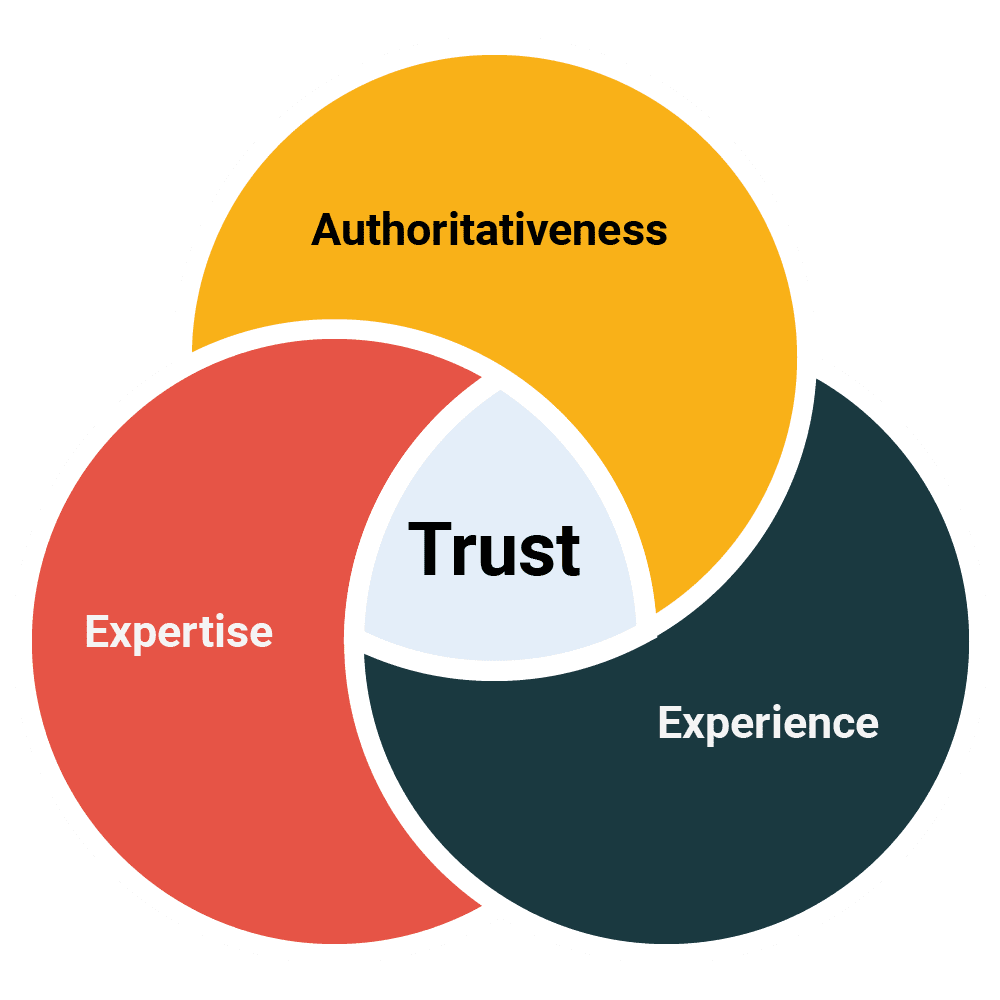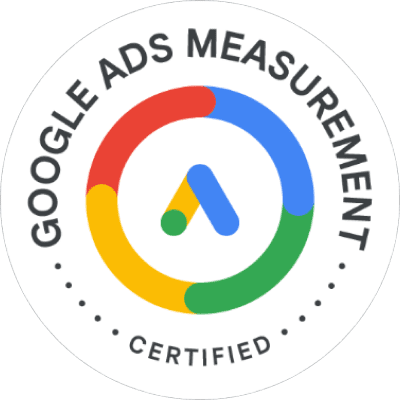Google EEAT stands for Experience, Expertise, Authoritativeness, and Trustworthiness. Google first introduced EAT in its Search Quality Rater Guidelines in 2014 and added the extra ‘E’ for experience in 2022.
Google EEAT signals help the search engine judge the quality of a webpage, which affects how well the page will rank in search results.
Since Google introduced EAT, many business owners and marketers have been confused about what it really means and how it affects rankings. With the addition of “experience” and the 2022 Helpful Content update, it’s now even more important to understand how Google uses EEAT to rank websites.
In this article, I’ll explain what Google EEAT signals means and why it matters for your SEO efforts. I’ll also share simple, practical ways to create a good user experience, show your expertise, build authority, and gain trust for your website. But first, let’s define EEAT.
What is EEAT?
EEAT stands for Experience, Expertise, Authoritativeness, and Trustworthiness.
Google wants to provide the best experience for its users, so it gives higher rankings to content that meets the highest quality standards. Google judges the quality of a webpage based on Experience, Expertise, Authoritativeness, and Trustworthiness, as explained in its Search Quality Raters Guidelines.

One way to think of Google EEAT is like a four-legged stool—your website needs all four parts to be strong. Each part (Experience, Expertise, Authoritativeness, and Trustworthiness) shows how much your business should be seen as a leader in its field.
Here’s a breakdown of each part:
Experience
- Google looks at whether the content comes from someone with personal experience.
- Google prefers reviews and content from people who have actually used a product or service.
Expertise
- Google favours content created by experts in a specific subject.
- Google checks for expertise at the content level, not just the overall website.
- Your website should show that you have deep knowledge in your field.
- Google compares your content to others to see if it shows more expertise.
Authoritativeness
- Authority is about your reputation, especially among other experts and influencers.
- Authoritative sites are considered the best sources of information on a topic.
- Authority is specific to your area of expertise.
Trustworthiness
- Trust is the most important part of Google EEAT.
Even if your site has experience, expertise, and authority, if it lacks trust, Google will rank it lower. - Trustworthiness includes having a secure website
- using HTTPS instead of HTTP.
- including your company name and contact information
- having a Google Business Profile
- Having privacy policies, refund/return policies
- secure payment methods are also important for trust.
- Trustworthiness is about how accurate, transparent, and legitimate your content is.
- Google checks who created the content
- If the information is backed by expert opinions.
- Trustworthiness is also specific to your area of expertise.
Where Does EEAT Come From?
Now that you know what EEAT is, let’s talk about where it comes from and how Google uses it to measure content quality.
EEAT SEO comes from a set of guidelines that Google created for its quality assurance team, known as “Search Quality Raters.”
Search Quality Raters
Search Quality Raters are real people who check the quality of search results after the Search Engine and Algorithm team makes changes.
According to their guidelines, the EEAT score is “very important” for pages that have a beneficial purpose. Google tells these raters to consider:
- The entire website
- The authors of the content
- The EEAT of the main content on the page they’re reviewing
But what exactly is “main content”?
Google explains what main content means in its guidelines. For search quality raters, main content can be:
- The page title
- Text
- Images
- Videos
- Page features
- User-generated content like videos, comments, or articles uploaded by users
Using Google EEAT signals, Search Quality Raters evaluate page quality on a scale from lowest to highest.
Search Quality Evaluator Guidelines
The Search Quality Evaluator Guidelines are used by human quality raters to assess websites and search engine results pages (SERPs). These guidelines are detailed in a 176-page document that explains how to rate page quality step-by-step.
While the work of Search Quality Raters doesn’t directly affect rankings, Google uses their assessments to improve its search algorithm. This is why SEO experts pay attention to the EEAT guidelines to understand what Google is looking for.
“…we have been occasionally asked if E-A-T is a ranking factor. Our automated systems use a mix of many different signals to rank great content. We’ve tried to make this mix align what human beings would agree is great content as they would assess it according to E-A-T criteria. Given this, assessing your own content in terms of E-A-T criteria may help align it conceptually with the different signals that our automated systems use to rank content.”
Google Search Central August 01, 2019
Google EEAT Guidelines include:
- How to find out who wrote the content or who owns the website.
- How to check the experience, expertise, authority, and trustworthiness (EEAT) of content creators.
- How to judge the quality of a webpage and its content.
- What makes content high-quality or low-quality.
- Which websites need high EEAT, like those involving money or health (YMYL sites).
- How to compare a website’s mobile experience to its desktop experience.
- What types of pages or designs could be harmful to users.
- How to rate websites and pages from “Fully Meets User Needs” to “Fails to Meet User Needs.”
With so many websites online, you might wonder why Google cares about EEAT signals. The reason is simple—it’s about safety.
Why Is EEAT So Important?
Google’s goal is to organise the world’s information and make it easy for everyone to find and use. EEAT SEO is part of Google’s effort to stop people from tricking the system (like using too many keywords) and to reward content that is helpful, high-quality, and trustworthy.
EEAT SEO is essential because it helps the search engine show searchers the most useful and high-quality content when they search for something. I believe Google strives to address what most marketers and SEO companies ignore or can’t afford to address: “Will people actually like this?”
Checking the trustworthiness of content also ensures a safe browsing experience, especially for those at risk of scams or identity theft.
As Search Quality Raters give more feedback, Google’s search engine gets better at recognising EEAT signals. The smarter Google’s algorithm gets, the better it can promote high-quality content and push low-quality content to the bottom of search results.
If you don’t improve your EEAT SEO, you might get lower rankings, less traffic, fewer leads, and less revenue. If you can’t prove experience, expertise, authority, and trust, Google will favour your competitor’s content and send your potential customers to them instead of you.
How Does EEAT SEO Affect Algorithm Updates?
Google’s ability to measure EEAT and use it to rank websites has improved over time.
For example, in early August 2018, Google made a big update to its algorithm, often called the “Medic” update. Although Google didn’t confirm it, many in the SEO community analysed the data and found that this update negatively affected YMYL sites (those involving money or health) that didn’t meet EEAT standards. On the other hand, it seemed to help YMYL sites that had high-quality content. The conclusion is that YMYL sites must make sure their EEAT signals are strong.
As Google gets better at measuring expertise, authority, and trust, these signals will have a bigger impact on page rankings. Expect EEAT SEO to become even more important as future updates continue to make the algorithm better at recognising quality content, much like a human would.
How Does Google Link Ranking Signals to EEAT?
Backlinks and mentions are primordial to any website’s success.
Carefully chosen backlinks from relevant, high-authority websites are key to a strong SEO strategy. They are one of the best ways to show your expertise in your industry.
Google is able to filter out the valuable, authoritative backlinks from the ones that aren’t. They assess links by checking how close they are to “seed” pages. According to Google’s algorithm patent, seed pages are reliable, cover a wide range of topics, and have many links to other pages.
Other Google EEAT signals include:
- Positive reviews
- Good reputation
- Mentions in forums
Is EEAT a Ranking Factor?
There’s been a lot of confusion about whether EEAT is a ranking factor.
A “ranking factor” is something objective and measurable, like the number of backlinks a site has.
Experience, expertise, authoritativeness, and trustworthiness are human ideas that are harder to measure. That’s why Google uses Quality Raters to check if the algorithm updates meant to measure these qualities are doing a good job.
With help from humans, Google is getting better at measuring EEAT signals. So, while EEAT isn’t a direct ranking factor, it does influence rankings and will continue to do so.
By improving your experience, expertise, authority, and trust signals, you can boost your chances of ranking well in search results.
What Happens When You Ignore EEAT signals?
Ignoring Google’s advice on ranking quality websites is a bad idea. If you don’t follow Google EEAT guidelines, two things might happen:
- Best case: You’ll fall behind competitors who do follow Google EEAT guidelines.
- Worst case: Your site might be penalised for untrustworthy content, especially if you have YMYL content.
Addressing EEAT SEO Is Not a Quick Fix
There’s no quick fixes to the damage done by ignoring EEAT SEO. While some strategies may lead to faster improvements in search rankings, there’s no guaranteed way to see immediate results. Consistent effort to improve your site’s experience, expertise, authority, and trustworthiness will eventually lead to better rankings.
How To Improve EEAT SEO
Recent updates to Google’s guidelines and algorithm show that experience, expertise, authority, and trustworthiness are now more important for rankings than ever.
Here are some tips to boost your EEAT SEO ratings and improve your chances of outranking your competitors:
1. Audit Your Brand
Having a good brand reputation is crucial to rank well. If it’s hard to find information about who runs your brand, how to contact you, or what your business does, people might see your site as untrustworthy.
Here are some questions to help you audit your brand:
What are people saying about your business and website?
Check reviews, social media, and forums to see what people are saying. Look for positive feedback, and address any issues if you find negative comments. Set up Google Alerts or use monitoring tools to track mentions of your brand.
Who are you? How long has your business been around? What are your values?
Provide detailed information about your company so people understand who you are, what you stand for, and what you aim to achieve.
What makes your company unique?
Highlight what sets your company apart, whether it’s your history, values, or community involvement. This helps build a positive image and shows potential customers why they should choose you.
Make sure all this information is easy to find on your website and social media pages. Visitors and Google’s Search Quality Raters need to quickly see who you are and what you offer.
2. Audit Your Content
Keeping your website content fresh is important for maintaining your ranking and improving EEAT signals.
Here’s how to audit your content for EEAT SEO:
- Update key pages: Refresh pages that explain who you are and what you do.
- Assign authors: Make sure all written content has a clear author.
- Update citations and references: Refresh outdated citations and references on all pages and blog posts.
Audit “About” Pages
Google values pages like “Contact Us,” “About Us,” “About,” or “Company” because they provide important details about your website.
Use these pages to clearly explain:
- Why people should trust your company.
- Who writes your content and their qualifications.
- Information about your team members, including links to their professional social media profiles and associations.
Providing details about your team’s experience and titles helps build trust and shows the professional authority of your staff.
Audit Authorship
Ensure each piece of content is linked to a specific author with a biography page. This page should include their qualifications and experience, showing why readers can trust their expertise.
Attach an industry expert to your content, whether it’s a staff member or someone from your leadership team.
Enhance author expertise by:
- Having authors active and responsive on social media platforms like LinkedIn and Twitter.
- Finding opportunities for staff to be interviewed and quoted online.
- Helping staff publish relevant content in respected publications.
- Ensuring author bios on guest posts link to their social media profiles, personal sites, company bios, or Wikipedia pages.
Check your contributors’ online reputations to ensure they are seen as authoritative and expert.
Audit Citations & References
Good citations and references show expertise and authority.
- Include external links and citations when quoting statistics, making claims, or mentioning industry benchmarks.
- Make sure all external links go to current, high-authority content. The quality of the sites you link to affects your own EEAT signals.
3. Audit Your Social Media & Reputation
Social media and online reviews are important for your business’s reputation. Even if a page has high-quality content, it won’t be rated highly if there are strong negative reviews.
According to Google’s guidelines, raters look for mentions of your website in articles, reviews, forums, and discussions.
Here’s how to handle feedback:
- Check where people are talking about your business: Look at places like Google Business Profile, Yelp, the Better Business Bureau, Amazon, and Google Shopping.
- Address negative reviews and comments: You can’t erase bad reviews, but showing that you respond to and fix issues builds trust. Ignoring negative feedback can harm your reputation and affect your EEAT rating.
- Show you’re listening by creating content that addresses common concerns from reviews or social media comments. Use these concerns as keywords for new pages.
Improve Google EEAT With a Trusted EEAT SEO Partner
Improving EEAT is key to a successful SEO strategy and good business practice. A good SEO agency can help you identify and fix EEAT SEO issues, making sure your site gets the attention it deserves.
If you’re interested in how a partnership with Hawk SEO can help, contact us for a free consultation and start building trust and driving growth with the lens of caring.







